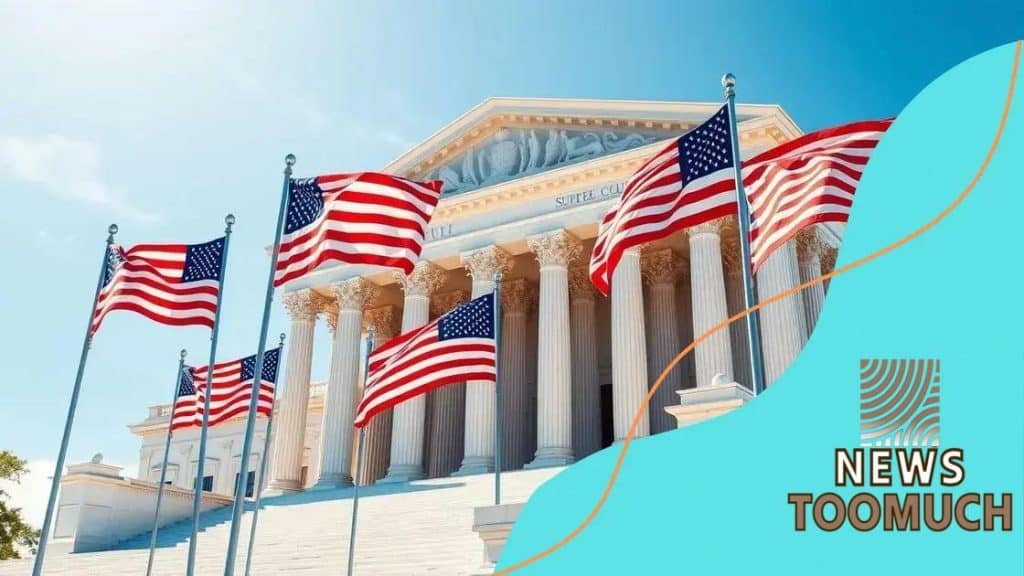Supreme Court supports Fed independence: What it means

The Federal Reserve plays a key role in maintaining economic stability, with its independence enabling it to implement monetary policy without political pressure, helping to control inflation and guide interest rates.
A recent Supreme Court ruling upholding the Fed’s autonomy could reshape the future of U.S. monetary policy.
Wondering how this decision might affect the economy and your financial plans? Let’s explore what it means.
Background on the Federal Reserve
The Federal Reserve, often referred to as the Fed, plays a crucial role in maintaining the stability and health of the U.S. economy.
Established in 1913 through the Federal Reserve Act, it serves as the central bank of the United States, tasked with managing the nation’s monetary policy, supervising financial institutions, and ensuring a stable financial system.
Understanding its background is essential to appreciating the significance of its independence in shaping economic outcomes.
The Fed was created in response to a series of severe financial panics that disrupted the U.S. economy in the late 19th and early 20th centuries, exposing the need for a central authority to stabilize the banking system.
One of its core objectives was to establish a safer, more elastic, and resilient monetary framework that could respond effectively to economic shocks, support sustainable growth, and prevent future crises.
Key Functions of the Federal Reserve
Today, the Fed has several essential functions:
-
Monetary Policy: The Fed regulates the money supply and influences interest rates to promote economic stability.
-
Supervision: It oversees and regulates banks to ensure the safety and soundness of the banking system.
-
Financial Services: The Fed provides various services to the government and financial institutions, including processing transactions.
-
Maintain Financial Stability: It monitors the economy and intervenes during financial crises.
The Federal Reserve operates independently within the government, which means its decisions do not require approval from the President or Congress. This independence is key to creating trust in monetary policy.
However, the balance of power between the Fed and the government can be a topic of debate. Throughout history, various presidents and lawmakers have voiced differing opinions about the Fed’s role.
Understanding this back-and-forth helps in recognizing the significance of the Fed’s current independence.
Key arguments for Fed independence
The debate around the Federal Reserve’s independence is filled with various key arguments that highlight its importance.
Advocates argue that it allows for unbiased economic decisions that stabilize the economy. One major argument is that an independent Fed can act quickly and effectively in times of economic distress.
When monetary policy decisions are made without political interference, they tend to be more focused on long-term economic health rather than short-term political gains.
Benefits of an Independent Federal Reserve
Several benefits emerge from maintaining Fed independence:
-
Maintaining Price Stability: An independent Fed can control inflation more effectively, which is vital for economic confidence.
-
Enhancing Credibility: Avoiding political pressure boosts trust among investors and consumers.
-
Fostering Economic Growth: Independence supports sustainable growth by providing consistency and predictability.
-
Preventing Political Cycles: Keeps monetary policy insulated from election-year influence.
The opposing viewpoint argues that without accountability to elected officials, the Federal Reserve risks making decisions that may not align with public interests.
This raises important questions about the right balance between independence and democratic oversight.
Critics argue that some level of transparency and external supervision is essential to keep the Fed grounded in broader social and economic needs.
Yet, most experts agree: a strong degree of independence is vital for making objective, long-term decisions in support of economic stability.
Recent cases affecting the Fed

Several recent cases have had significant effects on the operations and independence of the Federal Reserve.
These cases highlight the ongoing tensions between the Fed’s decisions and the broader political landscape.
One of the most notable cases involved challenges to monetary policy decisions made during economic downturns.
Supreme Court reviews examined whether the Fed’s actions during crises were justified and legal, bringing questions about its powers to act swiftly.
Key Cases to Consider
Among the important cases are:
- Case A: This case revolved around the Fed’s emergency lending facilities during the pandemic. Some argued these actions overstepped legal boundaries.
- Case B: In this instance, the Fed faced scrutiny over its bond-buying program, with plaintiffs claiming it unfairly favored certain sectors of the economy.
- Case C: This case focused on the Fed’s transparency, with courts evaluating the need for clearer communication of its decisions to the public.
- Case D: The outcome of this litigation may reshape the Fed’s influence on monetary policy and its ability to respond to future crises.
These cases reflect the broader discussions about the balance of power in economic governance.
As the Federal Reserve navigates legal challenges, its independence and decision-making will likely be scrutinized more than ever.
Furthermore, public perception plays a crucial role in these cases. The legal outcomes, especially those influenced by the Supreme Court, can either bolster the Fed’s authority or create more calls for regulation and oversight.
Observers are keenly aware of how these rulings will set precedents for future actions by the Fed.
Economic implications of the ruling
The economic implications of the recent Supreme Court ruling regarding the Federal Reserve are significant and wide-reaching.
These decisions can directly affect the stability of the financial markets and the overall economy.
When courts affirm the Fed’s independence, it reinforces confidence in monetary policy. This trust encourages investment and spending, which are vital for economic growth.
However, if the Supreme Court ruling limits the Fed’s authority, it may lead to uncertainty in financial circles.
Potential Outcomes of the Ruling
Several key outcomes could arise from the ruling:
- Interest Rate Changes: If the ruling restricts the Fed’s ability to set rates effectively, we may see increased volatility in interest rates, influencing loans and mortgages.
- Inflation Control: A strong, independent Fed is often better at controlling inflation. If its authority is diminished, inflation could rise, eroding purchasing power.
- Market Reactions: Economic actors often respond to Fed decisions. Changes in its perceived independence can lead to fluctuations in stock and bond markets.
- Global Economic Influence: The Fed is viewed as a leader among central banks. Its independence bolsters the U.S. dollar, affecting international trade and investment flows.
As the economy responds to these legal determinations, analysts will closely monitor indicators like employment rates and consumer behavior.
The Supreme Court ruling impacts not just immediate economic conditions but also long-term growth trajectories.
In summary, the economic implications of the Fed’s ruling are intertwined with how confidently markets can react to future decisions.
Investors tend to favor stability, and maintaining the Fed’s independence is crucial for fostering an environment conducive to sustainable growth.
Public response to the decision
The public response to the recent Supreme Court decision regarding the Federal Reserve has been varied and significant.
Many individuals and groups have voiced their opinions, reflecting broader concerns about economic stability and governance.
Initially, there was a wave of optimism among business leaders who believe that a strong, independent
Fed can create a favorable environment for economic growth. They argue that the Fed’s decisions directly impact interest rates and lending practices.
Different Perspectives on the Ruling
Responses can be categorized into several viewpoints:
- Support from Economists: Many economists support the ruling, citing the importance of an independent Fed for maintaining price stability and controlling inflation.
- Concerns from Activist Groups: Some activist groups express concern that reduced oversight could lead to risky financial practices that may harm consumers.
- Political Reactions: Politicians have been divided, with some praising the decision as a victory for economic independence and others warning of potential negative consequences.
- Market Analysts’ Opinions: Analysts have been closely monitoring stock market reactions following the ruling, as public sentiment can influence investment behaviors.
Moreover, social media platforms have become a hub for discussions on this topic. Citizens are airing their thoughts, with many weighing in on how they believe the Fed’s independence will affect their daily lives.
Some responding to the ruling express skepticism about whether the Fed can remain impartial in the face of political pressures.
Others feel a cautious optimism, hoping for beneficial changes in monetary policy that will lead to improved economic conditions.
Future outlook for the Federal Reserve

The future outlook for the Federal Reserve is a topic of great interest as the economic landscape continues to evolve.
Many experts are speculating about how the Fed will adapt to changing conditions, both domestically and globally.
One key aspect of this outlook is how the Fed will approach interest rates in the coming years. With varying economic indicators, decisions on rate changes will likely depend on inflation trends and employment levels.
Potential Challenges Ahead
Several challenges may impact the Fed’s future actions:
- Inflation Management: The Fed will need to find a balance between controlling inflation and supporting economic growth.
- Global Economic Conditions: International events, such as trade tensions or geopolitical conflicts, could influence the Fed’s decisions.
- Technological Advances: As technology transforms economies, the Fed may need to adapt its policies to accommodate new financial models and payment systems.
- Public Perception: How the public perceives the Fed’s effectiveness can affect its credibility and ability to successfully implement monetary policy.
As the economy continues to recover from recent challenges, the Fed’s adaptability will be tested. It is essential for the Fed to remain transparent in its decision-making processes to maintain public trust.
Moreover, interactions with lawmakers and other regulatory bodies may shape the Fed’s policies moving forward.
The balance of independence and accountability will continue to play a critical role in how the Fed navigates future economic hurdles.
FAQ – Frequently Asked Questions about the Federal Reserve
Why is the Federal Reserve’s independence important?
The Fed’s independence is crucial for maintaining trust in monetary policy, allowing it to make unbiased decisions that support long-term economic stability.
How can recent rulings affect the economy?
Recent rulings may influence interest rates and inflation control, which directly impacts borrowing costs and overall economic growth.
What challenges does the Federal Reserve face moving forward?
The Fed faces challenges such as managing inflation, adapting to global economic conditions, and maintaining public confidence in its decisions.
How does public perception influence the Federal Reserve?
Public perception can significantly affect the Fed’s actions and its ability to implement effective monetary policy, making transparency and communication essential.





